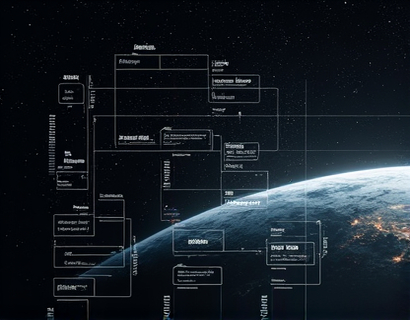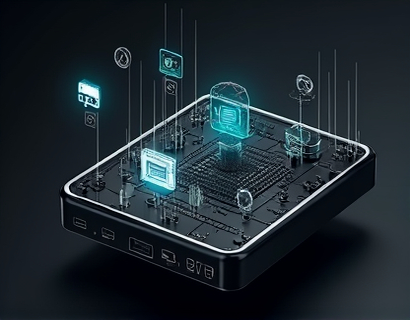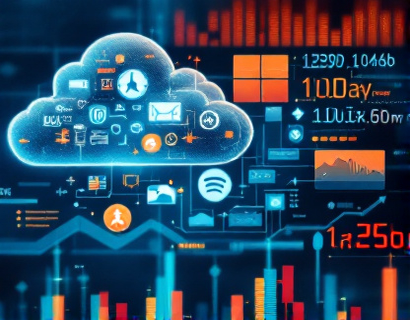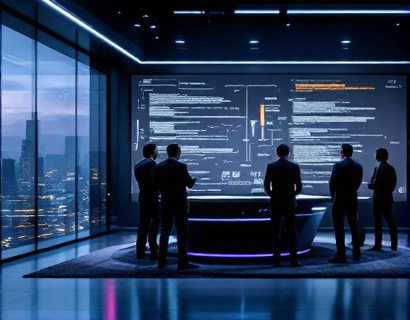Maximizing Digital Transformation: Harnessing AI and Crypto for Enhanced Engagement and Growth
The digital landscape is rapidly evolving, driven by advancements in artificial intelligence and blockchain technology. Businesses and tech enthusiasts seeking to stay ahead must understand how to integrate these technologies to maximize digital transformation, enhance user engagement, and drive sustainable growth. This article delves into strategic insights on leveraging AI and blockchain, specifically within the context of a platform that combines these technologies to elevate digital presence and unlock new opportunities.
Understanding the Synergy Between AI and Blockchain
AI and blockchain, though distinct, complement each other in ways that can revolutionize various industries. AI's strength lies in its ability to process vast amounts of data, learn from patterns, and make predictions or decisions with minimal human intervention. Blockchain, on the other hand, offers a decentralized, secure, and transparent way to record transactions and manage data. When combined, these technologies can create robust systems that are not only efficient but also trustworthy and resilient.
The synergy between AI and blockchain is particularly potent in enhancing digital transformation. For instance, AI can optimize blockchain networks by improving consensus mechanisms, reducing energy consumption, and enhancing scalability. Conversely, blockchain can provide a secure and immutable layer for AI applications, ensuring data integrity and privacy. This combination can lead to more reliable and efficient digital solutions, which are crucial for businesses aiming to thrive in the current tech landscape.
Enhancing Online Presence Through AI and Blockchain
In the digital age, having a strong online presence is vital for any business. AI and blockchain can significantly enhance this presence by providing innovative tools and platforms that engage users more effectively. For example, AI-driven chatbots can offer personalized customer support, while blockchain-based identity verification systems can ensure secure and seamless user interactions. By integrating these technologies, businesses can create a more engaging and trustworthy online environment.
Moreover, AI can analyze user behavior and preferences to deliver tailored content and recommendations, increasing user retention and satisfaction. Blockchain can further enhance this by providing a transparent and tamper-proof record of user interactions, building trust and loyalty. This dual approach not only improves user experience but also fosters a community of engaged and loyal customers.
Driving Growth with Blockchain and AI
Growth in the digital era is not just about increasing user numbers but also about creating value and fostering sustainable development. AI and blockchain can play pivotal roles in this process. For businesses, AI can optimize operations, reduce costs, and open up new revenue streams through data-driven insights and automation. Blockchain can facilitate secure and efficient transactions, reduce fraud, and enable new business models such as decentralized finance (DeFi) and tokenized assets.
One of the key ways AI and blockchain can drive growth is through the creation of decentralized applications (dApps). These applications leverage blockchain's decentralized nature and AI's computational power to offer innovative solutions that traditional centralized applications cannot match. For instance, dApps can provide decentralized marketplaces, voting systems, and supply chain management solutions that are more transparent, secure, and efficient.
Additionally, the use of smart contracts, powered by blockchain, can automate and enforce agreements without the need for intermediaries. When combined with AI, smart contracts can become even more intelligent, adapting to changing conditions and optimizing outcomes. This can lead to significant cost savings and increased efficiency, driving business growth and competitiveness.
Building Trust and Transparency
Trust is a critical factor in any business, especially in the digital realm where data security and privacy are paramount. AI and blockchain can work together to build and maintain trust by ensuring transparency and security. Blockchain's immutable ledger provides a verifiable record of transactions, while AI can enhance this by detecting and preventing fraudulent activities in real-time.
For example, in the financial sector, a platform that uses blockchain for transaction recording and AI for fraud detection can offer a high level of security and transparency. This combination can reassure users and partners, leading to increased trust and loyalty. Similarly, in supply chain management, blockchain can track the origin and movement of goods, while AI can analyze this data to optimize logistics and ensure compliance with regulations.
By leveraging these technologies, businesses can demonstrate their commitment to transparency and security, which is increasingly important in a world where data breaches and fraud are common concerns. This not only enhances the brand's reputation but also attracts more customers and partners who value trust and integrity.
Innovative Business Models
The integration of AI and blockchain opens up new possibilities for business models that were previously unimaginable. One such model is the token economy, where tokens represent value and can be used for various purposes such as transactions, rewards, and governance. By issuing tokens on a blockchain, businesses can create decentralized ecosystems where users have a stake in the platform's success.
AI can enhance this model by providing insights into user behavior and preferences, allowing for the creation of more effective token incentives and rewards. For instance, a platform could use AI to analyze user engagement and issue tokens to the most active and valuable contributors, fostering a community-driven approach. This not only increases user participation but also aligns the interests of users and the platform, leading to mutual growth and success.
Another innovative model is the use of AI-powered predictive analytics on a blockchain-based platform. This can enable businesses to offer predictive services, such as forecasting market trends or customer behavior, to other companies. By leveraging the transparency and security of blockchain, these services can be trusted and widely adopted, creating a new revenue stream for the business.
Challenges and Considerations
While the potential benefits of integrating AI and blockchain are significant, there are also challenges and considerations that businesses must address. One of the primary challenges is the technical complexity involved in implementing these technologies. Both AI and blockchain require specialized knowledge and resources, which can be a barrier for smaller businesses or those without a dedicated tech team.
To overcome this, businesses can collaborate with tech partners or leverage cloud-based solutions that offer AI and blockchain services on a pay-as-you-go basis. This can make these technologies more accessible and reduce the initial investment required.
Another consideration is the regulatory landscape. As AI and blockchain are relatively new and rapidly evolving, regulations are still catching up. Businesses must stay informed about local and international regulations to ensure compliance and avoid legal issues. Engaging with regulatory bodies and participating in industry standards can also help shape a favorable regulatory environment.
Data privacy and security are additional concerns. While blockchain provides a secure way to store data, the integration with AI requires careful handling of sensitive information. Implementing robust data governance policies and using privacy-preserving techniques, such as differential privacy, can help mitigate these risks.
Case Studies and Real-World Applications
To better understand the practical applications of AI and blockchain, let's look at a few real-world examples. One notable example is the use of blockchain for supply chain management. Companies like IBM and Maersk have developed blockchain-based platforms to track the movement of goods, ensuring transparency and reducing fraud. AI can further enhance these platforms by analyzing data to optimize routes, predict demand, and identify potential bottlenecks.
In the healthcare sector, a blockchain-based patient record system combined with AI can improve data security and provide personalized medical recommendations. AI can analyze patient data to identify patterns and predict health risks, while blockchain ensures that this data is secure and accessible only to authorized personnel.
Another example is the use of AI and blockchain in the creative industry. Platforms like Audius use blockchain to create a decentralized music streaming service, allowing artists to earn directly from their fans without intermediaries. AI can enhance this by recommending music based on user preferences and behavior, creating a more engaging and personalized experience.
Future Trends and Opportunities
The future of AI and blockchain is exciting, with numerous trends and opportunities on the horizon. One trend is the increasing adoption of decentralized finance (DeFi) platforms, which use blockchain to provide financial services such as lending, borrowing, and trading without traditional financial institutions. AI can further enhance DeFi by providing sophisticated risk management tools and personalized financial advice.
Another trend is the rise of Web3, a vision for the next generation of the internet that is decentralized, user-owned, and powered by blockchain and AI. Web3 aims to give users more control over their data and online experiences, reducing the power of centralized platforms. Businesses that embrace Web3 can tap into a new market of users who value decentralization and privacy.
Additionally, the integration of AI with the Internet of Things (IoT) is opening up new possibilities for smart homes, cities, and industries. AI can process the vast amounts of data generated by IoT devices, while blockchain can ensure the security and integrity of this data. This combination can lead to more efficient and intelligent systems that improve quality of life and operational efficiency.
As these technologies continue to evolve, businesses that proactively adopt and innovate with AI and blockchain will be well-positioned to capitalize on emerging opportunities and stay ahead of the competition.
In conclusion, the integration of AI and blockchain offers a powerful toolkit for businesses looking to maximize digital transformation, enhance user engagement, and drive growth. By understanding the synergy between these technologies and addressing the associated challenges, businesses can create innovative solutions that not only improve their operations but also build trust and loyalty among their users. Embracing this digital frontier is not just an option but a necessity for those who want to thrive in the evolving tech landscape.










































